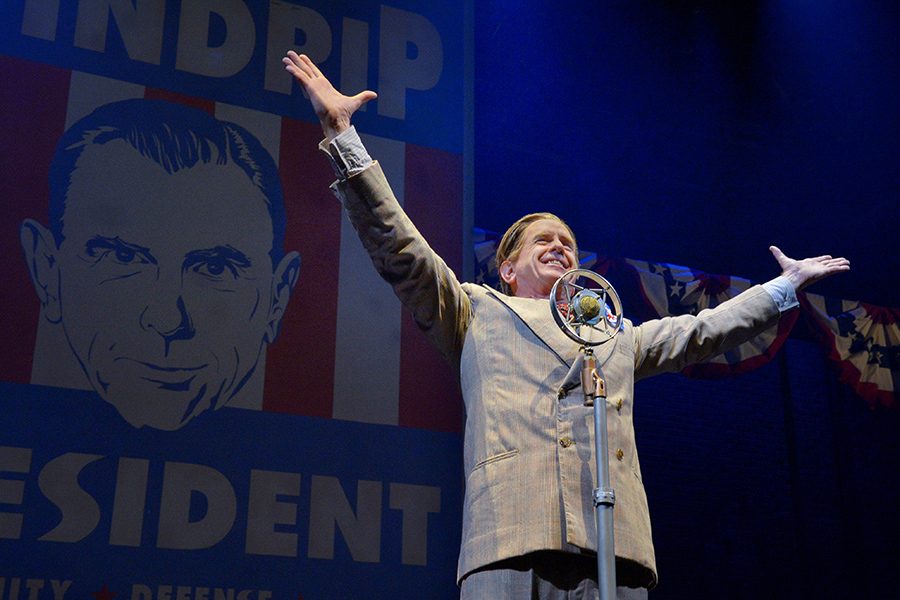Play depicts life beneath authoritarian dictatorship
Social, political issues examined through satire
Oct 21, 2016
The award-winning cast of characters put on an elaborate and political performance about what could happen if fascism erupted in America in the play “It Can’t Happen Here,” at the Berkeley Repertory Theatre. The cast even features Bay Area homegrown talent with affiliations to Contra Costa College.
The protagonist, Doremus Jessup, is a liberal middle-class newspaper editor from Vermont. He writes for the Daily Informer. Jessup is caught between all the political pandemonium and family life and he witnesses how this changes the future infrastructure of every day people in his small town.
Jessup watches society unravel in the midst of the authoritarian dictatorship under President Buzz Windrip.
Fascism, which is a far rightwing authoritarian type of government, was prominent in Italy, Spain and Germany during the 1930s and functioned based on three primary beliefs that we see throughout the play: intolerance of political disagreement, violence as a necessary element in society, and strong enthusiasm for the motherland.
We see the social landscape change when President Windrip gets elected because he has already put together a private security police force called the Minute Men, who later turn into a federal army. They are made up of WASPS paid by Windrip’s regime to take care of all political dissent.
The play is based on a novel of the same name by Sinclair Lewis, set in 1935, just six years after the beginning of the Great Depression, and poor white folks were the majority. One of the characters, Shad Ledue, is through with being a laborer for Jessup and sees the $5,000 offered by Windrip’s filthy regime as an opportunity to revolt and get power over his life and Jessup’s.
Greed and power are the catalysts that drive Ledue’s character in the second half of the play, turning him into a villain when he works as a Minute Man. Windrip makes a promise that all citizens who join the Minute Men will get $5,000, but we never find out if he follows through.
Throughout the play, we see the government enact martial law where military personnel have the authority to make and enforce civil and criminal laws, therefore suspending specific civil liberties, like the right to be free from unreasonable searches and seizures.
The play sheds light on what this may have been like for Jews living in Nazi Germany during 1935 with Hitler’s overarching power and use of the Nuremberg Laws, which deprived Jews of their rights as German citizens.
The two freedoms taken away from average citizens that the play drew parallels between the Jews and the middle class Americans, were the government imposing their unjust force of searching and seizing property in one’s house and the tensions around Jessup’s daughter dating Shad, because he was a Minute Man working for the government.
In the play Jessup takes a bold stand by writing an in-depth article about how much he disagrees with Windrip’s administration, outright denying Windrip as president of the United States.
The government convicts Jessup of seditious libel and puts him in prison. Later, we learn that the only reason they let him out is because he’s forced to write pro-Windrip editorials.
This is when Jessup quits and starts to write for what they call “The Underground.” We notice similarities in the play when Jessup doesn’t approve of his daughter Sissy spending time with Shad because he represents the force that put him in jail.
There’s irony in the title alone, because although people think that having an authoritarian dictator “could never happen here in America,” current presidential candidate Donald Trump is an example of the reminder to all Americans that it surely “can happen here.”
Both in the play and in our current presidential election, we find examples of applying a populist tactic to set everybody against a scapegoat, using anger and fear to get their messages across and rallying the forces behind them.
The play reiterates this motto of “the only thing we have to fear is fear itself,” which is a similar philosophy that Trump demonstrates. Trump gives the impression that Muslims and Mexican immigrants aren’t welcome in the U.S.
Before he gets elected, Windrip says, “I will create a safe haven for everyone in the United States,” which turned out to be untrue in the play. This sounds startlingly similar to when Trump says he will, “make America great again.”
When he says this it could have the opposite effect. Isn’t it true that when you force someone out of where they live it will only infuriate them? It’s almost chilling to the bone, because you realize the events in the play foreshadow the real-life Trump campaign “exactly” eight decades later.
In a sense, Trump’s carefully planned business spiel and reactionary delusion parallels the tactics used by Senator Berzelius Buzz Windrip, aims at the uneducated populace to gain votes.
Also interwoven into the fibers of the fine-print of the play, is this concept that influential members of society are worried that “radicals” are going to take advantage of the general population’s living conditions and stage a revolution.
One of many meaningful lines in the play is when President Windrip says, “Capitalism, Trump’s democracy,” and the audience thinks, “Yeah right, like there’s ‘no pun intended’ there.”
The fact is, the very definition of Capitalism – which is an economic system in which investment in and ownership of the means of production, distribution and exchange of wealth is made and maintained chiefly by private individuals or corporations.



